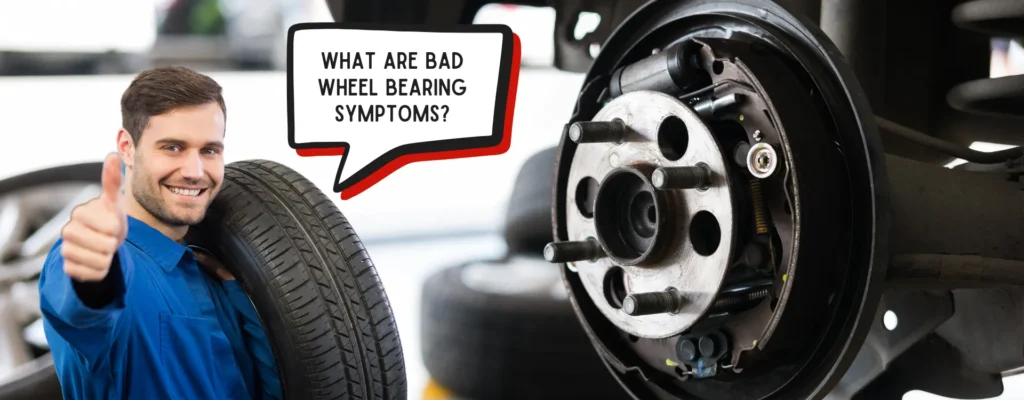
In California, the roads are as varied as the scenery, from the bustling freeways of Los Angeles to the winding coastal routes of Big Sur. Keeping your vehicle in top condition is crucial for safety and performance. One often overlooked yet critical component of your vehicle is the wheel bearing. Understanding the signs of wheel bearing failure can prevent serious accidents and costly repairs.
IN NEED OF A POST- ACCIDENT CAR REPAIR?
What Are Wheel Bearings?
Wheel bearings are an integral part of your vehicle’s suspension system. These small, metal balls encased in a ring allow your wheels to spin with minimal friction.
They are located inside the wheel hub assembly, which connects the wheel to the axle. Given their crucial role, keeping wheel bearings in good condition is vital for the overall health of your car.
Symptoms of Faulty Wheel Bearing
Identifying bad wheel bearing symptoms early can save you from further damage to the vehicle you’re driving. Here are some common indicators that your wheel bearings might need attention:
Unusual Noises
One of the most noticeable signs of worn-out wheel bearings is unusual noise coming from the wheel area. This noise often sounds like grinding, humming, or growling and tends to get louder as you accelerate. The noise is typically more noticeable when turning, which puts additional pressure on the bearings.
Uneven Tire Wear
Other signs of wheel bearing failure include uneven tire wear. If one of your tires is wearing down faster than the others, it could indicate that the wheel bearing is not functioning correctly. This uneven wear can lead to poor handling and reduced tire lifespan.
Vibrations
Experiencing vibrations in your steering wheel is another sign that the wheel bearing is bad. These vibrations are usually felt more strongly at higher speeds and can make driving uncomfortable and unsafe.
Wheel Wobble
Wheel wobble is one of the more severe symptoms of a bad wheel bearing. If you notice that one of your wheels feels loose or wobbly, it could indicate that the bearing is severely worn. If such is the case, refrain from driving and bring your car to the shop right away. This issue can lead to loss of control and poses a significant safety risk.
The Impact of Bad Wheel Bearings
Ignoring bad wheel bearing symptoms can have serious consequences. Here’s why it’s critical to address these issues promptly:
Safety Risks
Failing wheel bearings can compromise your vehicle’s handling, making it more difficult to control, especially at high speeds or on rough roads. This can increase the risk of collisions.
Further Damage
Driving with bad wheel bearings can cause additional damage to other parts of your vehicle, such as the hub, spindle, brake, and even the transmission. This can lead to more expensive repairs in the long run.
Costly Repairs
Replacing wheel bearings early can save you money. If signs of wheel bearing failure are left unchecked, the damage caused by bad wheel bearings can escalate, resulting in the need for more extensive and costly repairs.
Diagnosing Bearing Issues
Proper diagnosis of bad wheel bearing symptoms typically requires a professional inspection. Here’s what you can expect during a check-up:
Road Test
A technician may take your car for a road test to listen for noises and feel for vibrations. This can help pinpoint which parts might be problematic.
Visual Inspection
During a visual inspection, the mechanic will check for signs of damage or wear around the hub area. They might also look for any play or wobble in the wheel.
Jack and Wiggle Test
The jack and wiggle test involves lifting the vehicle and manually checking each wheel for looseness or wobbling, indicating a potential bearing issue.
Preventive Maintenance
Regular maintenance can help prevent signs of wheel bearing failure and extend the life of your vehicle’s parts.
Regular Inspections
Have your wheel bearings checked regularly as part of your vehicle’s routine maintenance schedule. This can help catch issues early before they become major problems.
Keep Wheels Clean
Dirt and debris can accelerate wear on wheel bearings. Keeping your wheels clean can help protect the bearings from going bad and any unnecessary wear and tear.
Address Issues Promptly
If you notice any bad wheel bearing symptoms, don’t delay getting them checked out. Addressing problems promptly can save you from more extensive damage and higher repair costs.
When Wheel Bearings Fail, Find a Reliable Collision Center To Fix Them The Right Way.
If you suspect wheel bearing malfunction issues, finding a reputable body shop for repairs is critical. California has plenty of trusted collision centers that can help you maintain your vehicle’s performance and safety. Collision Connect can assist you in locating an auto body shop that meets your needs.
Whether it’s unusual noises, vibrations, or uneven tire wear, signs of wheel bearing failure should never be ignored. Regular maintenance and timely repairs can prevent further damage and ensure a smooth, safe ride.Need to get your vehicle repaired?
Find a Car Repair Shop near you now.
IN NEED OF A POST- ACCIDENT CAR REPAIR?